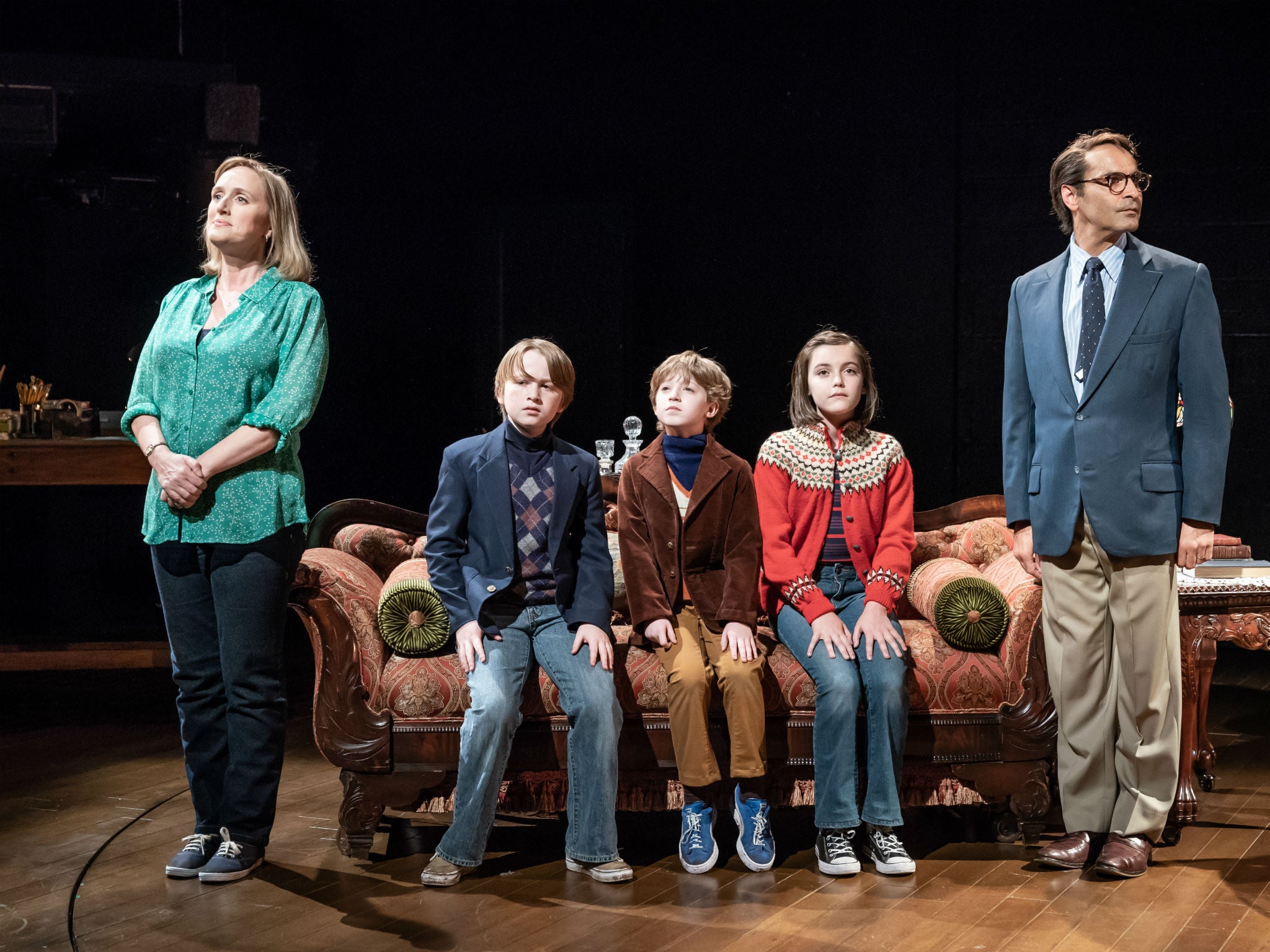Fun Home, Young Vic, London, review: Another groundbreaking masterpiece from Jeanine Tesori
A sublime adaptation of Alison Bechdel’s acclaimed graphic-novel memoir about growing up lesbian in small-town Pennsylvania with a closeted gay father

You might have thought that Jeanine Tesori would have her work cut out composing something as perfect in its singularity as Caroline, or Change, her musical about a black maid in a Jewish household at the time of the civil rights movement. But, in collaboration this time with dramatist Lisa Kron who wrote the book and the lyrics, she’s pulled off another groundbreaking masterpiece with Fun Home.
The show is a sublime adaptation of Alison Bechdel’s acclaimed graphic-novel memoir about growing up as a lesbian in small town Pennsylvania with a closeted gay father who was forever obsessively restoring the family funeral home (hence the ironic title). In 2015, it was the first Broadway musical with a lesbian protagonist and went on to win five Tony Awards.
This delicate, stunning UK premiere – with the same director, Sam Gold, but an English cast and musicians – is a typically generous and visionary parting gift from the Young Vic’s former artistic director, David Lan, who programmed and produced it.
Bechdel subtitles her book A Family Tragicomic. The joyous blossoming of Alison’s sexuality at college coincides with the disintegration of her father. Ironically, she only learns of her father’s secret gay life as she is discovering her own lesbianism. There is no danger of spoilers here: she reveals early on that, four months after she came out to her parents, her father stepped in front of a truck with apparently suicidal intent.
True to the (almost purposively) disorganised nature of memory, the show keeps shifting around three time frames. The 43-year-old Alison (Kaisa Hammarlund) looks back at two younger selves as she combs the past for clues about her connection to this enigmatic parent.
Each of these Alisons gives a superlative performance. At the press night, Brooke Haynes took the breath away as Small Alison (she shares the roll with Harriet Turnbull), especially in “Ring of Keys”, that quiet, piercing song about the epiphany the girl experiences at the sight of a butch delivery woman in a diner. Eleanor Kane winningly captures the college student’s goofy rapture after losing her virginity: “I’m Changing My Major to Joan”.
The show has two big pastiche numbers – a Jackson 5 spoof that Small Alison and her brothers perform round one of the caskets (“We got Kleenex and your choice of psalm/Think of Bechdel when you need to embalm”) and, replete with psychedelic lightning, “Raincoat of Dreams”, a Partridge Family parody that’s grotesquely at variance with Alison’s actual home life.
In general, though, Tesori’s score is remarkable for the suppleness and spontaneity with which it searches for emotional truth rather than cater for traditional Broadway “slots”. Robust when it needs to be, it’s a sensitive – often transportingly beautiful – tissue of linked leitmotivs and achingly suspended harmonies, exquisitely performed here by Nigel Lilley and his six-piece band.
There’s a stunning moment in Gold’s excellent production when the bleak white wall that has evoked an unhappy New York trip rises and we get a deep view of the Bechdel drawing room in all its full, fussed over, sterile grandeur. In some ways, the spectacle is more bleak than the wall and, as the wife who has absorbed and suppressed the knowledge of all her husband’s gay infidelities, Jenna Russell is devastating in “Days and Days”, a song of angry regret that she has wasted her life as assistant curator in this museum.
Zubin Varla radiates a charismatic but toxic mix of narcissism and self-loathing as the closeted father. He’s a prisoner of his era, you might say. But you’d feel sorrier for him, if you didn’t reckon that he fed on subterfuge and lies and that he didn’t have the guts or the temperament to come out like his daughter. Varla superbly suggests that she dislodged something in him while preserving a sense of the imponderable – and he’s in great voice.
It’s a tribute to this wonderful show that it nevertheless manages to end in soaring, well-earned catharsis. A crime if it doesn’t transfer.
Until 1 September (youngvic.org)
Subscribe to Independent Premium to bookmark this article
Want to bookmark your favourite articles and stories to read or reference later? Start your Independent Premium subscription today.

Join our commenting forum
Join thought-provoking conversations, follow other Independent readers and see their replies